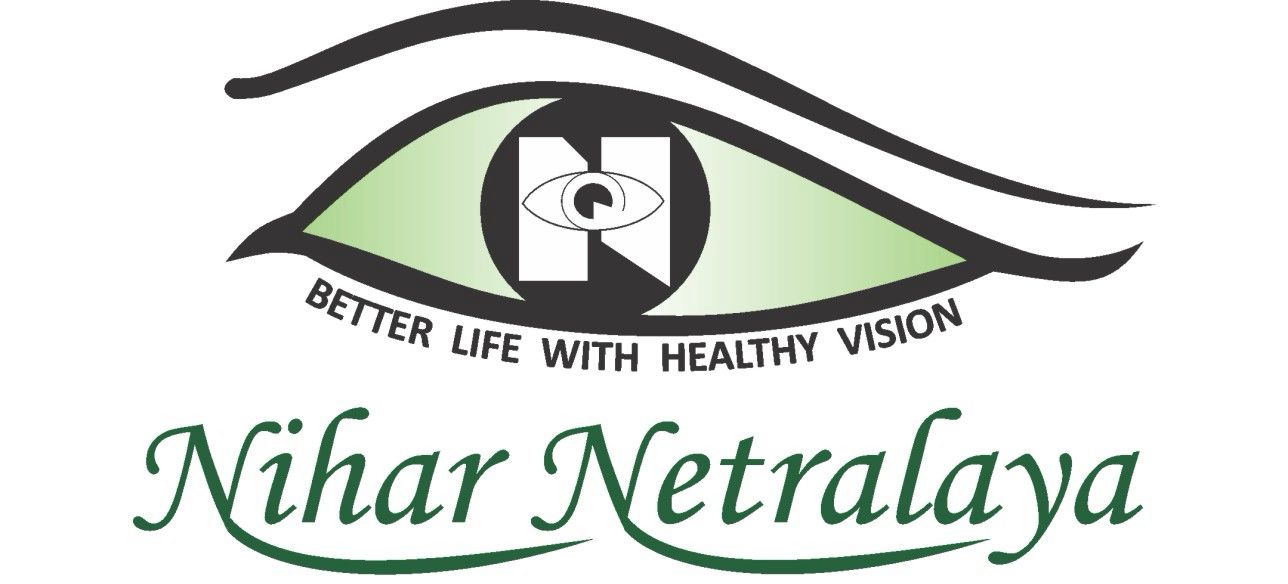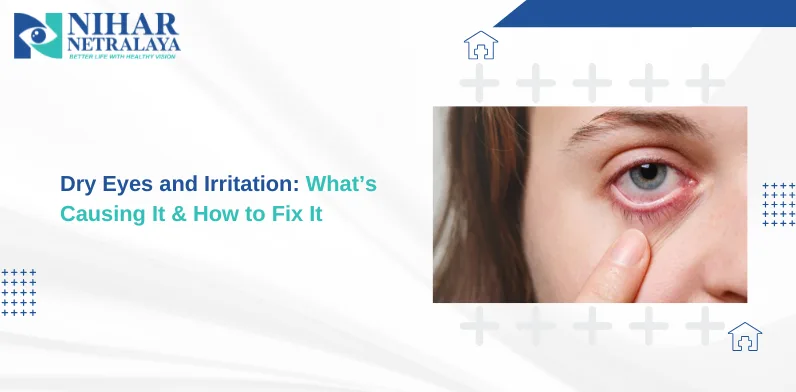According to the WHO, around 339 million people worldwide suffer from dry eye disease. Over 30% of the global population often complain of dry eyes and gritty sensations. But many are aware of the medical condition called dry eye syndrome.
Seeking timely consultation with the best eye consultant is crucial for accurate diagnosis and treatment. At a reputable eye hospital, professionals can guide you through treatments like LASIK treatment for refractive issues or even recommend cataract treatment if your symptoms are linked to age-related vision changes.
What is Dry Eye Syndrome and Its Types:
Tears keep your eyes moist and protect them. Dry Eyes is a medical situation where either the eyes do not produce enough tears. Or the tears produced evaporate very fast, due to internal or external conditions.
- Aqueous Deficient Dry Eye (ADDE) – When your eyes don’t produce enough tears to stay moist. It’s often linked to aging, autoimmune diseases like Sjogren’s syndrome, or damaged tear glands.
- Evaporative Dry Eye (EDE) – When your tears evaporate too fast. It’s usually caused by meibomian gland dysfunction. Here, the oil layer in tears is insufficient. Environmental factors like wind, pollution, or excessive screen time make the eyes feel dry and gritty.
Causes of Dry Eyes:

When you ask us, why does my eye feel dry and irritated, we will state only medical facts to alert you to ward of the following:
- Staring at screens (TV, computer, and Mobile phone) reduces the frequency of eye blinking. This causes tears to evaporate quickly, and the eye feels scratchy.
- Tear production decreases with age. People over 50 are more likely to complain that eyes feel dry and gritty.
- Environmental factors like the gush of sudden wind, smoke and dry air can increase tear evaporation. Air-conditioned or heated spaces will also worsen when eyes feel dry.
- Diabetes, thyroid disorders, and autoimmune conditions like Sjogren’s syndrome impact tear production. For such people also, eyes feel dry and irritated.
- The eye feels dry and sticky if medications like decongestants, antihistamines, antidepressants, and blood pressure medicines are taken regularly. These meds often reduce moisture in the eyes.
- Long-term use of contact lenses also makes the eyes feel dry and tired because of these natural tear production.
- Absence of essential nutrients (especially Vitamin A) will impact quality.
Symptoms of Dry Eyes:
- Burning sensation in eyes that makes you uncomfortable. This is a common early sign of dryness.
- Redness of eyes along with inflammation and irritation.
- Blurred vision due to insufficient moisture causing fluctuating vision.
- Eye fatigue especially during activities like reading or screen use.
- Sensitivity to light which makes you feel painful and uncomfortable.
- Watery eyes often, when the eyes try to compensate for dryness.
- Eyes feel dry and gritty, having a sensation of sandy sensation in their eyes.
Why Do My Eyes Feel So Dry and Irritated?

Dry eyes happen when the tear film loses balance. We have already listed all the main reasons and symptoms of why eyes feel dry and irritated.
But in the modern world there also are more internal and external factors that can make your eyes feel dry and sore.
- Hormonal changes, especially in women during pregnancy or menopause, often lead to dryness.
- Exposure to pollution and allergens can inflame the eye’s surface.
- Certain eye surgeries, like LASIK surgery, may also cause temporary eye dryness.
Risk Factors – Why Eyes Feel Scratchy?

Risk factors for dry eye disease are the ones that actually impact natural flow of tears production (which keeps the eyes moist naturally). These are:
- Eyelid problems like ectropion (the eyelid turns outward).
- Low humidity environments, such as airplane cabins, AC offices etc.
- Neurological conditions like Parkinson’s disease can reduce the blink rate. This will create unstable tears production.
- Rosacea and other skin disorders affect the eyelids and cause inflammation. This will be impacting tear gland function to make eyes feel dry and sore.
- Radiation therapy around the head or neck.
- Deficiency of omega-3 fatty acids.
- Chronic allergies and frequent use of preserved eye drops.
If your eyes often feel gritty, sore or tired, you must consult a medical expert immediately.
How is Dry Eye Diagnosed?

Doctors now use advanced methods to diagnose dry eye disease.
- Inflammatory Marker Testing – it checks specific proteins in your tears to detect inflammation often linked to dry eye.
- Osmolarity Testing – it measures the salt concentration in your tears. An imbalance here signals that eyes feel dry and gritty.
- Blink Analysis Technology is also used to track how often and how fully you blink. Incomplete blinking can cause dryness.
- Metabolomics studies the chemicals in your tears to spot early signs of dry eye.
- Keratograph imaging takes detailed pictures of the eye’s surface and checks tear glands. Deep learning technology measures tear levels.
- AI-based meibography analyses tear gland health using smart imaging.
- 3D ocular surface mapping creates a 3D picture of the eye to check dryness.
- Special tear film tests measure how fast your tears evaporate.
What To Do If You Experience Dry Eyes:
- Start by resting your eyes. You will need to follow the 20-20-20 rule – Every 20 minutes you look at something 20 feet away for 20 seconds or more.
- Secondly, as per medical advice, use artificial tears or lubrication drops, as per your eye condition. These should be preferably preservative-free drops.
- Thirdly, always stay hydrated by drinking enough water daily.
- In case you work in a dry environment like where AC is used more often, then your eye feels dry and sticky often. In that case, you need to modify your environment by using a humidifier. Or should be avoiding direct air from fans or air conditioners.
- Blink more often, especially when using TV, Mobile Phone, or Computer screens.
- Eat omega-3-rich foods like flax seeds and fish.
- Despite doing all the above under medical supervision, if further eyes feel dry and tired, then you have to undergo specialized treatment. We are sharing the next:
Treatment When Eyes Feel Dry and Sore:

If your eyes feel constantly dry and uncomfortable, there are the latest and advanced treatments for dry eyes. With the right care, your eyes can feel comfortable and refreshed again.
- Intense Pulsed Light (IPL) therapy eases inflammation and helps your tear glands work better. Scleral lenses act like a soothing shield. These will keep your eyes moist.
- Doctors may also suggest platelet-rich plasma (PRP) eye drops as per your eye condition. These drops use your body’s healing power to repair your eyes.
- In some cases, doctors employ nerve stimulation devices. These gently encourage natural tear production. In other cases, thermal pulsation also clears blocked glands. This will be restoring healthy tear flow. Depending on eye condition, in some cases, even Lipiflow Therapy uses heat and gentle pressure to clear blocked oil glands.
- Even simple changes like adding omega-3 to your diet can improve tear quality.
What to Do When My Eyes Feel Dry and Irritated:

Seek medical advice early to check the current condition of your eyes. And under medical supervision:
- Use preservative-free eye lubricant drop drops.
- Take regular breaks from screens.
- Stay hydrated, blink often while using a screen.
- Ddd omega-3 to your diet.
- Wear wraparound sunglasses in windy or sunny conditions.
- Prioritise proper sleep/eye rest and care for overall eye health.
When to See My Doctor?
As soon as you spot early symptoms of eyes feeling dry, you should see the doctor. Even after his advice, if symptoms of dry eyes persist, despite avoiding the causes, then consult your medical expert again. He will get a proper scanning done again and see if you need any further treatment like the above therapies that we have listed above.
Conclusion:
Dry eyes and irritation can be managed effectively with the right diagnosis and treatment. If you’re experiencing persistent symptoms, visiting a best eye hospital or consulting an eye specialist is important to determine the underlying cause.
Whether it’s due to environmental factors, age-related changes, or conditions requiring LASIK treatment or cataract treatment, seeking timely professional care is crucial. A best eye doctor can guide you through personalized treatment options including solutions offered by a contact lens clinic.
Additionally, following recommended treatments and using prescribed medications from an eye clinic pharmacy will help relieve discomfort and restore eye health. Your eyes make you see this beautiful world, so do not ignore their health!
FAQs:
Your eyes may feel dry due to reduced tear production or fast tear evaporation. Common causes include screen time, aging, pollution, air conditioning, or medical conditions like diabetes and thyroid disorders.
There are two types:
Aqueous Deficient Dry Eye (ADDE): Eyes do not produce enough tears.
Evaporative Dry Eye (EDE): Tears evaporate too fast due to issues like meibomian gland dysfunction.
You may feel a burning sensation, redness, eye fatigue, blurred vision, light sensitivity, and a gritty or sandy feeling in your eyes. Sometimes, watery eyes may also be a sign.
Staring at screens reduces your blinking rate, causing tears to evaporate faster. This makes your eyes feel dry, tired, and irritated.
Doctors use tests like inflammatory marker testing, osmolarity testing, blink analysis, AI-based meibography, and 3D ocular surface mapping to check tear quality and eye condition.
Doctors may recommend Intense Pulsed Light (IPL) therapy, PRP eye drops, scleral lenses, LipiFlow therapy, nerve stimulation devices, or thermal pulsation therapy to improve tear production.
If your eyes feel dry, sore, or gritty often, or if symptoms continue even after using eye drops and home remedies, visit an eye specialist for proper diagnosis and treatment.
Use preservative-free lubricating drops, blink often, take breaks from screens, wear sunglasses in dusty or windy areas, and eat a balanced diet with Omega-3 and Vitamin A.


